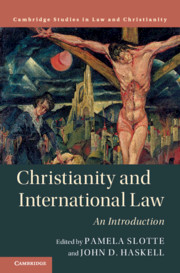Book contents
- Christianity and International Law
- Law and Christianity
- Christianity and International Law
- Copyright page
- Dedication
- Contents
- Tables
- Contributors
- Acknowledgments
- 1 Christianity and International Law: An Introduction
- 2 The Byzantine Commonwealth and the Emerging Features of a Law of Nations in the First Millennium
- 3 Christianity and the Birth of Ambassadorial Deontology: Some Historical Notes
- 4 Formation and Refiguration of the Canon Law on Trade with Infidels (c.1200–c.1600)
- 5 God, Sovereignty, and the Morality of Intervention outside Europe
- 6 The Significance of Christian Charity to International Law
- 7 Hugo Grotius: On Freedom of the Seas and Human Nature
- 8 Ius gentium et naturae: The Human Conscience and Early Modern International Law
- 9 Legalizing Antisemitism? The Legacy of Savigny’s Roman(tic) Law
- 10 Missionary Knowledge and the Empirical Foundations of Modern International Legal Thought
- 11 Standards for a Righteous and Civilized World: Religion and America’s Emergence as a Global Power
- 12 International Protestantism and Its Changing Religious Freedoms
- 13 Beyond the Freedom of Worship: The Contested Meaning of Religious Freedom in International Human Rights Law and Politics, 1945–1967
- 14 Process Theology and a Pluralistic Foundation for Human Rights
- 15 Christianity and Human Rights Law: Orthodox Perspectives
- 16 Conquest, Sacred Sites, and “Religion” in a Time of Crisis
- 17 Constantine’s Legacy: Preserving Empire While Undermining International Law
- 18 Hopelessly Practicing Law: Asylum Seekers, Advocates, and Hostile Jurisdictions
- 19 The Hidden Theology of International Legal Positivism
- Select Bibliography
- Index
1 - Christianity and International Law: An Introduction
Published online by Cambridge University Press: 17 May 2021
- Christianity and International Law
- Law and Christianity
- Christianity and International Law
- Copyright page
- Dedication
- Contents
- Tables
- Contributors
- Acknowledgments
- 1 Christianity and International Law: An Introduction
- 2 The Byzantine Commonwealth and the Emerging Features of a Law of Nations in the First Millennium
- 3 Christianity and the Birth of Ambassadorial Deontology: Some Historical Notes
- 4 Formation and Refiguration of the Canon Law on Trade with Infidels (c.1200–c.1600)
- 5 God, Sovereignty, and the Morality of Intervention outside Europe
- 6 The Significance of Christian Charity to International Law
- 7 Hugo Grotius: On Freedom of the Seas and Human Nature
- 8 Ius gentium et naturae: The Human Conscience and Early Modern International Law
- 9 Legalizing Antisemitism? The Legacy of Savigny’s Roman(tic) Law
- 10 Missionary Knowledge and the Empirical Foundations of Modern International Legal Thought
- 11 Standards for a Righteous and Civilized World: Religion and America’s Emergence as a Global Power
- 12 International Protestantism and Its Changing Religious Freedoms
- 13 Beyond the Freedom of Worship: The Contested Meaning of Religious Freedom in International Human Rights Law and Politics, 1945–1967
- 14 Process Theology and a Pluralistic Foundation for Human Rights
- 15 Christianity and Human Rights Law: Orthodox Perspectives
- 16 Conquest, Sacred Sites, and “Religion” in a Time of Crisis
- 17 Constantine’s Legacy: Preserving Empire While Undermining International Law
- 18 Hopelessly Practicing Law: Asylum Seekers, Advocates, and Hostile Jurisdictions
- 19 The Hidden Theology of International Legal Positivism
- Select Bibliography
- Index
Summary
The interplay between Christianity and international law … The terms “Christianity” and “international law,” as well as their relationship to each other, are not easy to understand – at least where there might be consensus. The aim here is to diagnose the elusiveness of these phenomena, to explain why this is important to understand, and to set the stage for further investigations.
So why is it that we cannot come to a consensus about this issue of “Christianity and international law”? If you are inclined, pause a moment with this text and build a list of possible reasons … Some contrarians might answer that we actually do have a relative consensus, that most reasonable people, at least with the opportunity to learn, find common agreement over most things and whatever differences simply reflect the diversity, the spice, the irreducible uniqueness of individual personalities and cultures.
Keywords
- Type
- Chapter
- Information
- Christianity and International LawAn Introduction, pp. 1 - 16Publisher: Cambridge University PressPrint publication year: 2021

